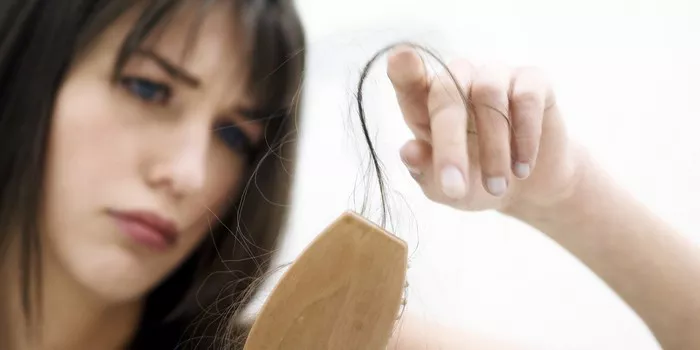Pregnancy brings about numerous changes in a woman’s body, and one common concern that arises after childbirth is hair fall. While many women experience a lush mane during pregnancy, the postpartum period often comes with unexpected hair shedding. In this article, we will explore the reasons behind hair fall after delivery, addressing hormonal fluctuations, nutritional factors, and other influences that contribute to this temporary phenomenon.
Understanding Pregnancy-Related Hair Changes
The “Pregnancy Glow”:
During pregnancy, hormonal changes, particularly increased levels of estrogen, lead to thicker and healthier-looking hair.
The elevated estrogen levels prolong the hair growth phase (anagen), resulting in reduced shedding.
Postpartum Hair Changes:
After childbirth, hormone levels, including estrogen, drop significantly.
The transition to postpartum life triggers a shedding phase known as telogen effluvium, leading to noticeable hair fall.
Hormonal Fluctuations: A Primary Factor
Estrogen Levels Decline:
Estrogen levels, which were elevated during pregnancy, return to pre-pregnancy levels or even lower after delivery.
This decline in estrogen contributes to the shift in the hair growth cycle, prompting more hair to enter the resting phase.
Prolactin and Hair Loss:
Prolactin, the hormone responsible for milk production, also influences hair growth.
Elevated prolactin levels during breastfeeding can contribute to hair shedding in the postpartum period.
Telogen Effluvium: Understanding the Shedding Phase
Telogen Effluvium Explained:
Telogen effluvium is a common cause of temporary hair shedding characterized by an increased number of hairs entering the telogen (resting) phase.
The shedding becomes noticeable several months after the triggering event, such as childbirth.
Delayed Impact:
The delay in the onset of postpartum hair shedding is due to the prolonged anagen phase during pregnancy.
As more hairs enter the telogen phase simultaneously, the shedding becomes apparent in the months following delivery.
Nutritional Factors: Impact on Postpartum Hair Health
Depletion of Nutrient Reserves:
Pregnancy places increased demands on the body for nutrients to support fetal development.
After childbirth, nutrient reserves may be depleted, affecting the overall health of hair.
Iron Deficiency and Hair Loss:
Iron deficiency, common postpartum, is linked to hair loss.
Adequate iron levels are crucial for the production of hemoglobin, which carries oxygen to hair follicles.
Stress and Sleep Deprivation: Influencing Hair Health
Physical Stress of Childbirth:
Childbirth is a physically demanding process, and the stress on the body can contribute to hair shedding.
Physical stressors, combined with hormonal changes, can exacerbate postpartum shedding.
Sleep Deprivation Impact:
New mothers often experience sleep deprivation, which can negatively affect overall health, including hair health.
Quality sleep is essential for the body’s recovery and maintenance of optimal physiological functions.
Postpartum Thyroid Changes: A Contributing Factor
Thyroid Hormone Fluctuations:
Changes in thyroid hormone levels, common postpartum, can influence hair growth.
Both hypothyroidism and hyperthyroidism have been associated with hair loss.
Thyroid Autoimmunity:
Autoimmune thyroid conditions, such as postpartum thyroiditis, can emerge after childbirth.
The immune system’s attack on the thyroid gland may contribute to hair shedding.
Managing Postpartum Hair Fall: Practical Approaches
Balanced Nutrition:
Maintaining a well-balanced diet rich in essential nutrients, including iron, vitamins, and proteins, supports overall hair health.
Consultation with a healthcare professional or a nutritionist can guide postpartum dietary choices.
Supplements and Postnatal Vitamins:
Postnatal vitamins, specifically formulated for the nutritional needs of new mothers, can provide additional support.
Supplements addressing specific deficiencies, such as iron or biotin, may be recommended based on individual needs.
Stress Management Techniques:
Incorporating stress management techniques, such as mindfulness, relaxation exercises, and adequate sleep, supports overall well-being.
Prioritizing self-care is essential during the demanding postpartum period.
When to Seek Professional Help:
Persistent or Excessive Hair Loss:
While postpartum shedding is a normal and temporary phenomenon, persistent or excessive hair loss may warrant professional evaluation.
Consulting with a dermatologist or healthcare provider can help rule out underlying medical conditions.
Signs of Other Health Issues:
Any signs of abnormal health issues, such as sudden weight loss, fatigue, or changes in skin and nails, should be discussed with a healthcare professional.
Addressing underlying health concerns contributes to holistic postpartum recovery.
Conclusion
In conclusion, hair fall after delivery is a common and temporary occurrence attributed to hormonal fluctuations, telogen effluvium, nutritional factors, stress, and thyroid changes. Understanding the underlying causes empowers new mothers to navigate this phase with informed choices, including balanced nutrition, supplements, stress management, and seeking professional help when needed. While postpartum shedding can be distressing, it is a transient phase, and most women experience significant hair regrowth as their bodies gradually adjust to postpartum life. Prioritizing self-care, both physically and emotionally, is key to a smoother postpartum recovery, including the restoration of healthy hair.

